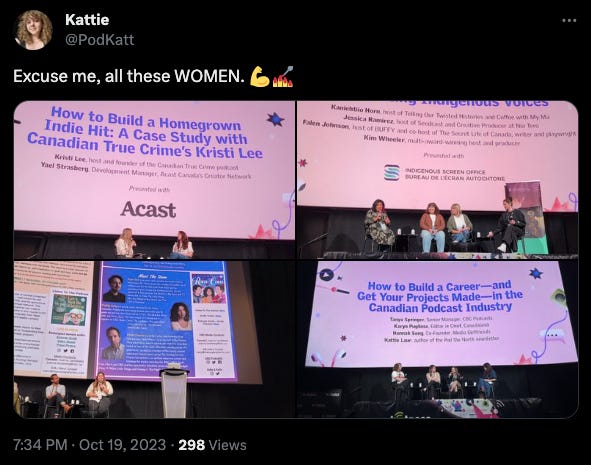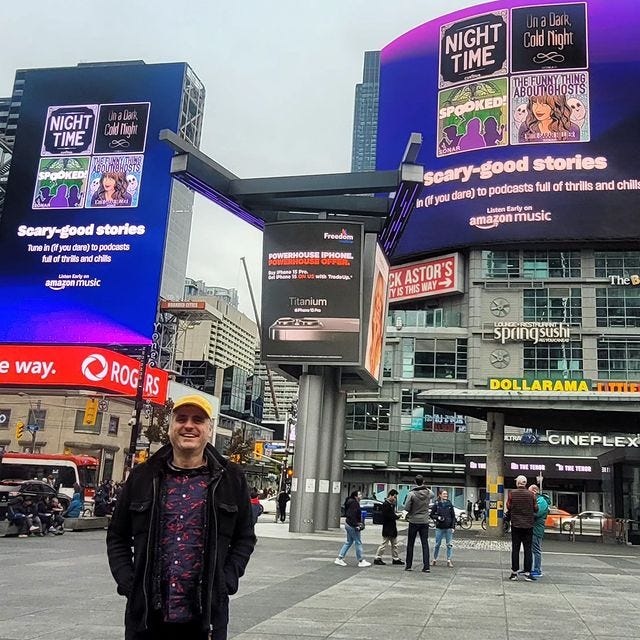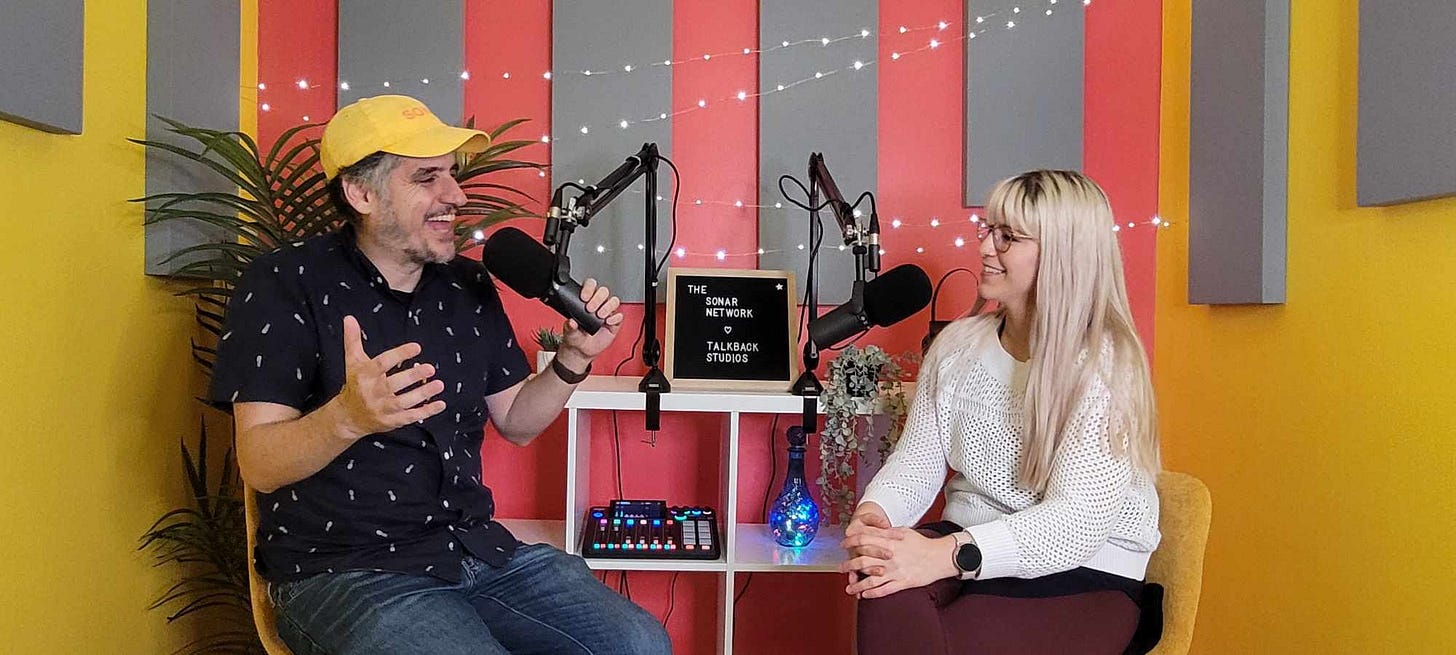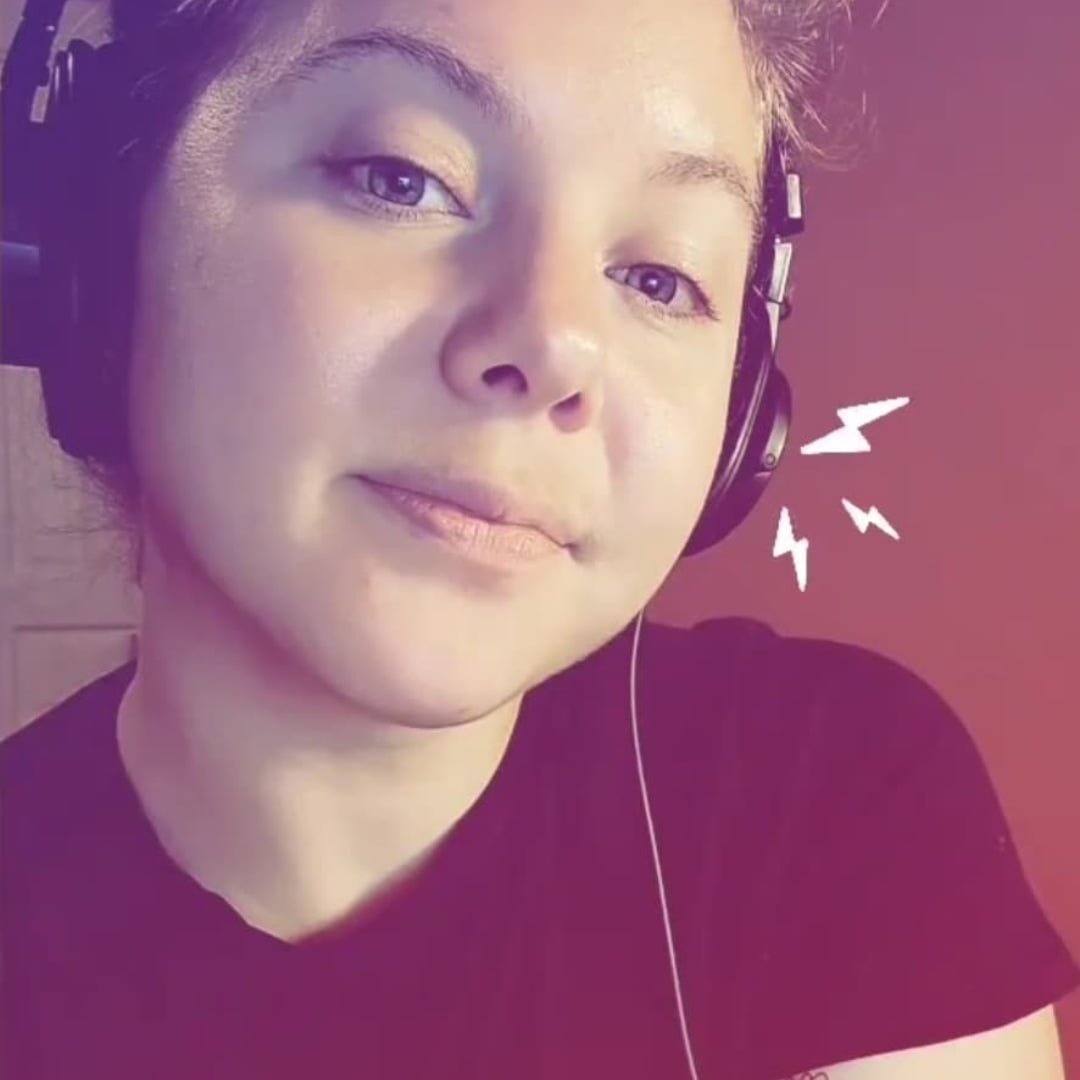An argument for why October is the best month ever.
Vol. 31 - A big month for the Sonar Network, and Canadian podcasting overall!
Hihi!! Happy Pod the North Tuesday Friday! I hope you had a great Hallowe’en and everyone complimented and recognized your costume!
In this issue:
Canadian podcasting thrived in October.
The Sonar Network says they’re all about making friends, but they’ll still take a million dollars if you have it…
Canadian Indie: Blue Eyes Crying By The Chips
True North Podcast Feature: Seedcast
There are currently 28 long-term drinking water advisories in effect in 26 First Nations communities across Canada.
October was an exciting month for Canadian Podcasting!
Selfishly, it was certainly a great month for Pod the North, having kicked it off with Pod the North LIVE!
But let’s look at the ecosystem as a whole, because plenty of new shows were launched throughout the month, including the likes of Mourning After Dark, FEEDBACK from Cue6 Theatre, Rooked: The Cheaters' Gambit, In Her Defence from the Globe and Mail, new seasons of Let’s Make A Horror from CBC Podcasts and COMMONS from Canadaland, and SO MANY MORE.
A ton of awards were dished out to Canadian podcasts across the country, including Black Podcasting Awards for Love, Janessa and My Hockey Hero, and Signal Awards for indie podcasts like HUMAN-B-GON and But What Do I Know?, and CBC’s The No Good, Terribly Kind, Wonderful Lives and Tragic Deaths of Barry and Honey Sherman. Connie Walker’s Stolen: Surviving St. Michael’s also won the Best Narrative Audio Award at the recent imagineNATIVE Film and Media Arts Festival!
Mid-month was the Hot Docs Podcast Festival, 4 days of podcasting festivities that included some incredible live shows and panels, like the one curated by the Indigenous Screen Office featuring Indigenous podcasting icons: Kaniehtiio Horn (Coffee With My Ma), Jessica Ramirez (Seedcast), Falen Johnson (Secret Life of Canada), and Kim Wheeler (Canadalandback).
HDPF’s Creators Forum events also included a wonderful presentation from Bumper’s Dan Misener on the future of podcasting, and yours truly also made it on stage for the first panel of the festival about the finding success in Canadian podcasting, joined by CBC Podcasts’ Tanya Springer, Canadaland’s Karyn Pugliese, and Media Girlfriends’ Hannah Sung.
And let me just say that the sheer amount of women at the forefront of the Canadian podcasting industry is awe-inspiring.
Canadaland also celebrated their 10 year anniversary with a really fun, SOLD OUT, live show, in which Jesse Brown was absolutely hounded by journalist, Jan Wong.
It’s been pretty wild to look back at what was certainly a chaotic but exciting month that’s left me craving about months worth of naps.
But I wanted to give a special shout out in particular to one indie Canadian podcast network who had an eventful month of their own…
Toronto’s own, Sonar Network!
Pod the North is open for ad bookings!
Tell the Canadian podcast community about your stuff by booking the one-and-only ad spot at the top of the newsletter.
Thoughts from the ecosystem:
The Sonar Network says they’re all about making friends, but they’ll still take a million dollars if you have it…
By the nature of this newsletter, I’ve been tracking announcements and news coming out of all Canadian podcast networks across the country. The Sonar Podcast Network in particular seems to have been pumping out news all throughout the month of October.
This has been especially exciting to witness considering that Sonar is completely independantly run. It’s no one’s full time job!
At the end of September, Sonar opened up their new studio to the public, The Sonar Room, at TalkBack Studios in Toronto.
Then, in October 2023 alone, Sonar had a new podcast join their network, Sarah Hillier’s The Funny Thing About Ghosts, which launched it’s first episode with headliner guest, Colin Mochrie (Who’s Line Is It Anyway).
Another incredible Sonar show, You Made Me Queer from Trevor Campbell, made it on stage at Pod the North LIVE!
Sonar Network’s podcasts also raked in plenty of awards and nominations, with three wins at the Signal Awards for Dwarven Moss, On a Dark, Cold Night, and Vanderpump Robs, and currently have about 28 nominations (from my quick counting) at the Canadian Podcast Awards.
Oh ya, and Toronto saw the Sonar Network podcasts on the big screen in Yonge and Dundas Square, to which Co-founder, Michael Mongiardi, said on Instagram, “there’s no shortage of rewarding moments, but this one is particularly surreal.”
If you attend any podcast events in Toronto, you’ll usually bump into Michael and Sonar’s Brand & Content Manager, Marianna Miniotis. I think I’ve accidentally seen them around five times this year, and they’re always down to have nerdy and totally frank conversations about the industry.
But October being a big month for Michael and Marianna isn’t a one-off either.
Momentum has been rolling for them all year and doesn’t look like it’s stopping anytime soon. Marianna told me, “there's so much going on at all times as Sonar grows and grows. Somebody wants us for this event, or we want to partner with someone to do a big thing or a new big show. Just so many more opportunities every year, and every year is getting a little bit harder to manage my time.”
Sounds stressful, but also like… really exciting!?!?!
It’s clear that the Sonar Network is well on its way to success, if it isn’t there already, but there are plenty of questions floating around the ecosystem about the role of podcast networks as the industry matures, and as podcasters try to find ways to grow their shows and audiences.
I talked to Michael and Marianna about how they’ve maintained the network since 2017, the role of networks in podcasting and what it takes to run one, and why it’s been important for them to stick to their Toronto roots (for the most part).
This interview has been edited for brevity and clarity.
Kattie Laur: So I want to pick your brains on what the heck is going on with podcast networks! I have many theories, but I want to know what you think about them compared to where you first started.
Marianna Miniotis: Okay, I'll speak for me, but it's hard for me to say anything about other networks, mainly because I don't really know the ins and outs of how they run, or what really unifies them as a network. But sometimes it's hard to know what the goal is behind a network, and I think that's the hardest thing.
For us, always top of mind is supporting the creators because we are a more creative network. The people that are providing entertainment value and performance, and writing, and art, that's what we want to support.
We grew out of the comedy community, so comedy and performance is important to us, and giving people in that space moral support, financial support, production support, and just to feel like they have a home and people behind them.
Michael Mongiardi: Ya, we started as more of a collective. I had a podcast in the early days of the network and I knew some other podcasters in the community.
I was a big listener of Earwolf [Podcast Network], especially at that time, and still am. What really drew me to Earwolf’s style was it was a community. It was a bunch of people, they work together, they go on each other's shows, all these different personalities as they come in and out. That's what we tried to foster and that's kind of how it started.
We are more interested in building a community – a fun community of creators – and maybe it's not the best business decision in the world but I believe in what we're doing and I think it's important. And I think ultimately in the end, if we foster creators and support people doing cool things and the diverse voices of this country that in the end everyone will win. But it might just be a slower path to get there.
KL: In terms of your perception of “blockbuster podcasts” and running a network, is finding a blockbuster podcast for your network something that you're concerned about or is focusing on the vibe of the network as a whole more your priority?
Marianna: I think it's always a challenge to find that balance because obviously, our number one priority is to have cool shows and support the creators and continue to build our brand thoughtfully, without just throwing in whatever big show.
The idea is also to pay the creators on our network and we can only do that if we monetize somehow, and we can only monetize if we're getting downloads.
We work on a revenue split model, so the shows get most of the ad revenue and the network takes a cut. The idea is that a big show can come on the network, and we can get some ad revenue from that, and then that goes into supporting the rest of the shows.
Even if the smaller shows are not generating that much revenue, the whole idea is that we'll do events where we'll highlight the smaller shows, or we'll buy an ad to promote one of the smaller shows using money from other shows, so that's kind of the idea.
KL: I know you guys have opened up some revenue generation through paid subscriptions like Patreon and Apple Podcasts, but how are the paid subscriptions going for you? Are you guys having a lot of luck with that?
Marianna: Patreon was hard for us to do, because it's just so much work to run. 99% of our job is wrangling different podcasters for different things and trying to get answers from people all day, so to try to track people down to give us whatever they wanna put up on the Patreon — it was a lot. So we were like, it's not worth it.
Apple subscriptions is going better. It's gives us a little bit more and it's a little bit more of a seamless integration with the app, so people subscribe a little more casually.
But what we noticed with Patreon, and it's kind of in general with the network, people don't care as much about a network and what they're doing. People want to hear from the shows and the hosts of the shows that they like to listen to.
I think we hit that problem with the Patreon and even social media. So we definitely encourage the hosts to engage with their audience because their audience doesn't really care about what the network has to say, even though we try to be fun and silly and interact with people. But it's really about the hosts and these creators that they love to listen to and they feel connected to.
The thing that we encourage the most when we bring on a new show is to participate in cross promotion with the rest of our shows because, like Mike said, a big inspiration for us was that fun cross-community on Earwolf. I was just listening to Erika Casupanan [host of Happy to See Me] on Sarah Hillier's new podcast and that was such a fun, weird mix that I didn't expect, and they had so much fun together. We love that.
KL: I feel like that's what is the success of a network; how collaborative and community-oriented the network is. There's no point in having a network if people aren't collaborating.
Michael: I agree with that statement, and that's what we're going for. But I think there are networks that are running very successfully without having the community feel. I could name a bunch of them, but they have their successful shows and they're each operating in a little silo and that's fine. But then it's like, I guess they're just a company that sells ads for you.
Marianna: That's why, also, as much as we also have expanded out of Toronto a little bit: we have a show in Montreal, we have a couple of shows in L. A., we have someone in Colorado…
Michael: We've got some people from the Yukon…
Marianna: We have people sprinkled around, and that's awesome and we want to keep doing that, but also the best way to foster that community – I mean, it's not the only way – is to go to our roots. So if someone pitches us a podcast from the Toronto comedy community, they're probably getting bonus points.
Michael: Yeah, honestly, when people do come to us from the Toronto comedy scene, a lot of the times I think they're not coming to us necessarily to be like, “I have a podcast idea, how can you help me make money?” They're coming to us like, “I have a podcast idea and I want to be part of this community that you've built.”
KL: I think that you've established a clever niche, that The Sonar Network is the network of Toronto comedians. If you were to go see a standup show in the city, then there's a high likelihood that that person is going to be connected to your network in some capacity, and then comedy-lovers become podcast-lovers!
Michael: I mean, when we first were building the network and we were designing the website with our designer, one feature that I completely stole from Earwolf – I think if Scott Aukerman ever saw our network he would sue me – but the one thing we loved was the people section.
We call it our people page, and it's anyone: all the hosts are there but also every single guest on any show. At this point I think we have 2000 or maybe more people.
We feel it helps build community, 'cause if someone is like, “Oh, I listened to Kattie on this show and she's really cool and funny,” they can go to your page and then see all the other shows you've guested on. And if [a guest] is a Toronto comedian, there's a good chance they're already in our database.
KL: So what's the biggest learning curve that you've had in this process of building the network?
Michael: People will [ask about] other networks, like, “is it competitive between you guys?”
I've really grown to adopt the opinion [that] there really isn't competition in podcasting, unless someone comes to the network and takes one of our shows – which hasn't happened and would be annoying.
But instead of looking at a similar show and crossing your arms and being like, “they're doing something to us” — there's 5 million or plus podcasts out there, there's no original ideas left — I take the opinion of “turn that frown upside down!”
Look at similar shows as an opportunity, not as a competition. You can reach out to them and do a guest swap swap with them. Their audience would probably like your show and vice versa. Maybe instead of being angry at each other, you can help each other.
That shift in my brain really made things a lot easier and also opened up a lot of opportunities. And still, sometimes we'll get weird reactions from networks that are trying to tow the line and not work with us because of competitive reasons. But I don't like to look at it as competition when there's an opportunity there for us all to support each other.
Marianna: We're all about making friends.
But the biggest barrier for me is just time. Where is the time to do everything?! I have a day job, I need to be able to pay my bills.
Sonar is bringing in some money, but most of that goes to the shows. I'm not making a living off Sonar by any means, but because we have this slow and steady approach and we want to root ourselves instead of just exploding on the scene somehow and then fizzling out. But I will say that I think that Sonar growing slowly in this way has been a huge benefit to us.
Michael: Ya, we've built up a name, we've built up a brand, and then we've built a company. We're not a billion dollar corporation or anything, but we're a small business and we're growing and we can continue to grow because we've been slowly building that foundation.
Marianna: That being said, if anybody wants to give us a million dollars, we'll take it and we'll do something great with it!
What Marianna and Michael are loving:
Check out this Canadian Indie: Blue Eyes Crying By The Chips
A weekly podcast from Niko Stratis about the beautiful songs that we love, and the amazing places we have cried to them in public.
True North Podcast Feature: Seedcast
A story-centered, Webby-nominated podcast from Nio Tero where we dig up, nurture, and root stories of the Indigenous experience from around the world.
What’s going on in Canada’s podcast ecosystem:
You should know…
The Opinionated Lushes are raising money for their 2nd Annual Tipsy All the Way
16-hour Livestream Fundraiser! If you have a business, project, or something you want to advertise, you can donate just $10 for a minute commercial on their upcoming livestream! The proceeds are going to some incredible causes. Get more info here!
Crime Story from CBC Podcasts and Kathleen Goldar recently made it to Times Square!
Frequency Podcast Network is back on Instagram and out of Meta’s Canadian news ban jail!
A recent episode of The Now and Next podcast, discusses North Bay Echo’s analytics. Half the downloads of the flagship podcast, To North Bay With Love comes from Echo website visits, where a variety of podcasts are promoted.
New releases:
There’s a new show out from Frequency called, In This Economy?! The new personal finance show “won’t tell you to stop buying lattes”. Each episode takes listener’s financial problems and explores the root cause. Weekly episodes start this week!
The Samara Centre for Democracy has released a French companion podcast to Humans of the House called Les Personnages de la Chambre. The six part series that features longform interviews with six former Members of Parliament from Quebec, who open up about what it means to be a French-speaking MP and their very different experiences in the House of Commons.
The Newfoundlander is a new show from Canadaland, that delves into journalist, Justin Brake’s family history, putting him in opposition to a story of shared Indigenous ancestry embraced by thousands of people across Newfoundland. It’s already had a ton of great reviews and
wrote an excellent piece about it over on that’s a must read!Underwater, a “sexy, neo-noir thriller and a first-of-its kind narrative album featuring original music by Jason Derulo” is out now. The show was directed by Pat and Chris Kelly and edited and sound designed at Kelly&Kelly.
Events:
Remember when a bunch of us met up a Tim Hortons last year to talk podcasts? The 2nd Annual Toronto Podcasters Meetup from Podfest, Libsyn, AAP, and Voice Overs and Vocals is on December 9th, where you can come meet some fellow Canadian podcasters, and FREE. Register here!
January Toronto Podcaster Meetup from Quill! Join for Quill podcasting for an evening of networking, drinks and bites, plus a fireside chat on Understanding Podcast Growth with Dan Misener and Miriam Johnson from the Bumper Team, on January 25th, 2024! Tickets are $25 and you can get them here!
For your pod:
Are your podcast downloads declining because of iOS 17? Dan Misener is telling you everything you need to know on the Bumper blog!
Ausha just launched a new feature, the Podcast Search Optimization (PSO) Control Panel for podcasters. The PSO Control Panel helps you master Podcast Search Optimization (PSO) on major listening apps. Check out some more info about this tool here.
It’s time to prepare your podcast for Spotify’s 2023 Wrapped! Spotify wants you to ensure that your show page is ready, with recommendations, links to your social media, and other tools to get the most out of it.
Get CoHost’s new a prefix tool without migrating from your current hosting provider! The tool gives advanced demographics, and allows B2B podcasters to know which companies are listening.
Just Joe (me and my mom on Hallowe’en)…
If you have thoughts or Canadian podcasting news, please share them with me! Leave a comment or reply to the newsletter email.
If you’re feeling generous there are a couple ways to financially support Pod the North at any budget. You can opt-in to pay for this Substack on a monthly or yearly basis, buy me a coffee, or now, buy an ad!
Thanks for supporting Pod the North, I’ll be back in your inbox in two weeks!
Kattie | @Podkatt (Twitter, Spotify, and Goodpods) | @PodtheNorth (Bluesky)









Thanks for the shout-out Kattie! Always full of great material here...